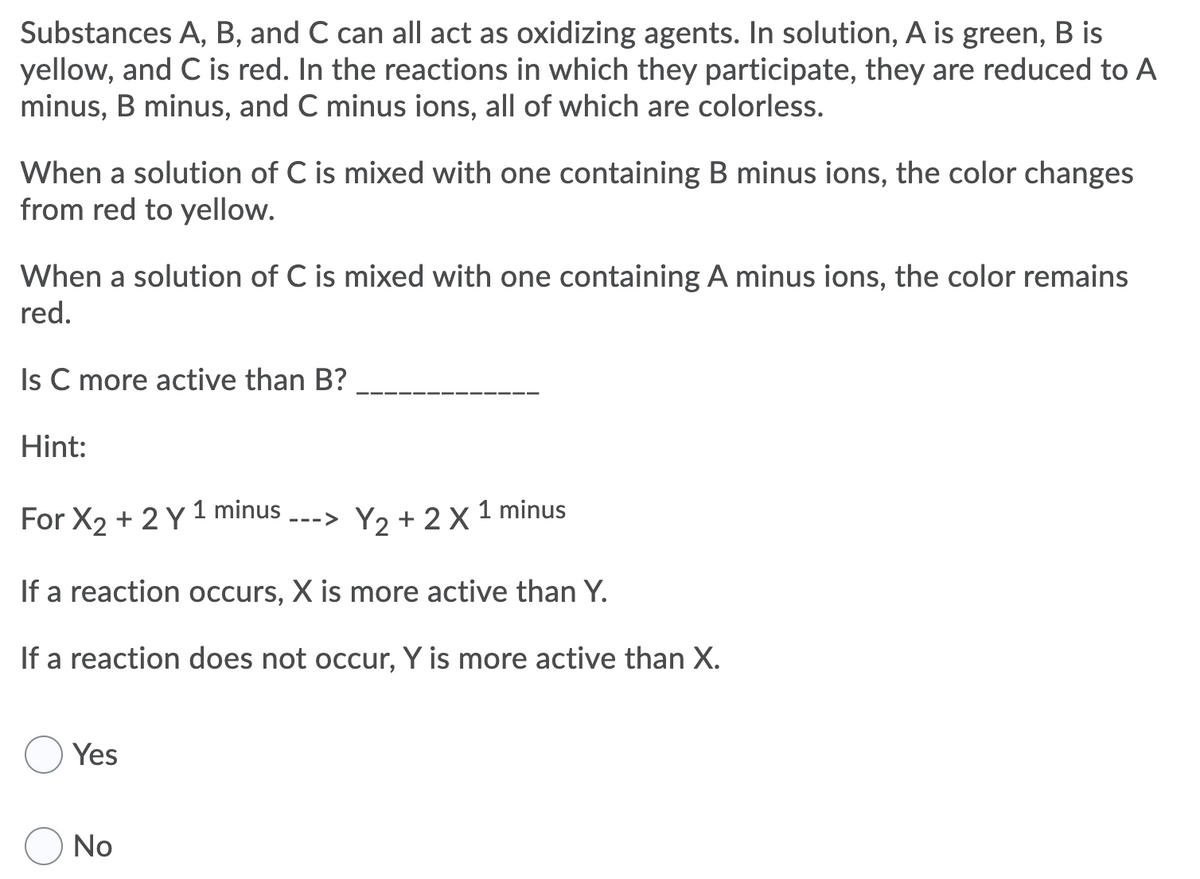Substances A, B, and C can all act as oxidizing agents. In solution, A is green, yellow, and C is red. In the reactions in which they participate, they are reduced to A minus, B minus, and C minus ions, all of which are colorless. is When a solution of C is mixed with one containing B minus ions, the color changes from red to yellow. When a solution of C is mixed with one containing A minus ions, the color remains red. Is C more active than B? Hint: For X2 + 2 Y 1 minus Y2 + 2 X 1 minus ---> If a reaction occurs, X is more active than Y. If a reaction does not occur, Y is more active than X. Yes No
Substances A, B, and C can all act as oxidizing agents. In solution, A is green, yellow, and C is red. In the reactions in which they participate, they are reduced to A minus, B minus, and C minus ions, all of which are colorless. is When a solution of C is mixed with one containing B minus ions, the color changes from red to yellow. When a solution of C is mixed with one containing A minus ions, the color remains red. Is C more active than B? Hint: For X2 + 2 Y 1 minus Y2 + 2 X 1 minus ---> If a reaction occurs, X is more active than Y. If a reaction does not occur, Y is more active than X. Yes No
Chemistry & Chemical Reactivity
9th Edition
ISBN:9781133949640
Author:John C. Kotz, Paul M. Treichel, John Townsend, David Treichel
Publisher:John C. Kotz, Paul M. Treichel, John Townsend, David Treichel
Chapter19: Principles Of Chemical Reactivity: Electron Transfer Reactions
Section: Chapter Questions
Problem 102IL: Four metals, A, B, C, and D, exhibit the following properties: (a) Only A and C react with 1.0 M...
Related questions
Question

Transcribed Image Text:Substances A, B, and C can all act as oxidizing agents. In solution, A is green, B is
yellow, and C is red. In the reactions in which they participate, they are reduced to A
minus, B minus, and C minus ions, all of which are colorless.
When a solution of C is mixed with one containing B minus ions, the color changes
from red to yellow.
When a solution of C is mixed with one containing A minus ions, the color remains
red.
Is C more active than B?
Hint:
For X2 + 2 Y 1 minus
Y2 + 2X 1 minus
--->
If a reaction occurs, X is more active than Y.
If a reaction does not occur, Y is more active than X.
Yes
No
Expert Solution
This question has been solved!
Explore an expertly crafted, step-by-step solution for a thorough understanding of key concepts.
Step by step
Solved in 2 steps with 2 images

Knowledge Booster
Learn more about
Need a deep-dive on the concept behind this application? Look no further. Learn more about this topic, chemistry and related others by exploring similar questions and additional content below.Recommended textbooks for you

Chemistry & Chemical Reactivity
Chemistry
ISBN:
9781133949640
Author:
John C. Kotz, Paul M. Treichel, John Townsend, David Treichel
Publisher:
Cengage Learning

Chemistry & Chemical Reactivity
Chemistry
ISBN:
9781337399074
Author:
John C. Kotz, Paul M. Treichel, John Townsend, David Treichel
Publisher:
Cengage Learning

Chemistry
Chemistry
ISBN:
9781305957404
Author:
Steven S. Zumdahl, Susan A. Zumdahl, Donald J. DeCoste
Publisher:
Cengage Learning

Chemistry & Chemical Reactivity
Chemistry
ISBN:
9781133949640
Author:
John C. Kotz, Paul M. Treichel, John Townsend, David Treichel
Publisher:
Cengage Learning

Chemistry & Chemical Reactivity
Chemistry
ISBN:
9781337399074
Author:
John C. Kotz, Paul M. Treichel, John Townsend, David Treichel
Publisher:
Cengage Learning

Chemistry
Chemistry
ISBN:
9781305957404
Author:
Steven S. Zumdahl, Susan A. Zumdahl, Donald J. DeCoste
Publisher:
Cengage Learning

Introductory Chemistry: A Foundation
Chemistry
ISBN:
9781337399425
Author:
Steven S. Zumdahl, Donald J. DeCoste
Publisher:
Cengage Learning

General Chemistry - Standalone book (MindTap Cour…
Chemistry
ISBN:
9781305580343
Author:
Steven D. Gammon, Ebbing, Darrell Ebbing, Steven D., Darrell; Gammon, Darrell Ebbing; Steven D. Gammon, Darrell D.; Gammon, Ebbing; Steven D. Gammon; Darrell
Publisher:
Cengage Learning

Chemistry: Principles and Practice
Chemistry
ISBN:
9780534420123
Author:
Daniel L. Reger, Scott R. Goode, David W. Ball, Edward Mercer
Publisher:
Cengage Learning